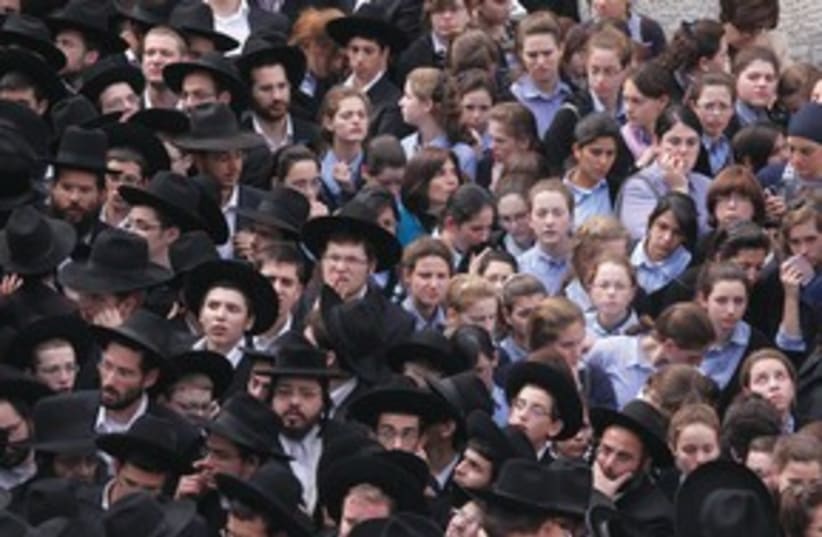Seven months ago, my daughter was born in Jerusalem. For both sides of the family she was the first one in many generations to be born in Israel, in Jerusalem no less. My joy at her birth and her upbringing in Jerusalem is tempered however by fear and concern as to what kind of city and country in which she will grow up. As one who chose to live in Israel, my Zionism did not end with my aliyah here, rather it only begins now by playing an active role in shaping the Jewish State, the place where I chose to live my life and raise my children.
Acts of exclusion and harassment of women and girls have dominated the headlines of late, though the phenomenon is not new. In many areas of Jerusalem, women are neither seen nor heard. A government deputy minister refused to allow women to appear before him to accept a prize in a state sponsored ceremony. Young girls in Beit Shemesh are attacked on their way to and from school for ‘dressing immodestly.’ Even in the IDF, which boasts female jet fighter pilots, women have been barred from performing during a public Hanukka singing ceremony.
The question, then, is what we citizens can do about this escalating situation. Looking into my smiling daughter’s face, I am resolved to take the following steps:
1. We must be active in our schools, whether Mamlachti (state) or Dati Mamlachti (state-religious), to ensure that our daughters and sons receive a top notch Jewish education taught in an engaging way.
This of course has supreme value in itself, essential for anyone who wants their children to find joy and meaning in their Judaism. As a committed Jew who believes that Judaism belongs to the entirety of the Jewish people I find it incredibly frustrating when traditional or secular Jews look up to the ultra-Orthodox community as the preservers of an authentic Jewish life. It is time for non-haredi Israelis to reclaim Judaism for ourselves and our children, this entails taking on responsibility and ownership for the transmission of our Jewish heritage.
A quality Jewish education will allow our children to resist those who claim to represent an ‘authentic’ or ‘pure’ form of Judaism which all too often means one that is exclusionary and narrow. Children bought up with a substantive Jewish education will know how to oppose such misleading voices with a much healthier Jewish alternative. As parents, we must be vigilant in ensuring that teachers and rabbis in our children’s’ schools are conveying a Judaism in which the status of Jewish women is inviolable.
Figures recently released by the Education Ministry show that 65 percent of state religious schools are single sex whereas ten years ago that figure stood at only 25 percent. According to former Deputy Education Minister Rabbi Michael Melchior, gender segregation “began with high school, moved to the youth movements and elementary schools, and soon it will also be at the crèche, and people will no longer sit together at events. The [religious] public is putting itself more and more in a substantially separate place from the general Israeli public and the possibility of creating a society together." The choice for a single gender school is a legitimate one, but children must have the opportunity for healthy interaction with the opposite sex.
2. If we want our daughters to be full members of the Jewish community, then we should affiliate ourselves with those synagogues and institutions that relate to women as full members and not as spectators.
Granted, there will be differences of opinion as how that can be achieved, especially in a way that conforms to Halacha, but the community must prioritize the inclusion and full participation of its female members.
3. On the political level, as voters, we must make it clear to the parties with which we affiliate or choose to vote for that religious freedom and the inclusion of women are not negotiable.
Coalition stability cannot be achieved at the expense of women. Prime Minister Binyamin Netanyahu has commendably spoken out clearly against the demeaning of women, yet such talk must be backed by government policy. The Chief Rabbinate can withhold recognition of non-haredi converts, the Kotel can function as a haredi synagogue with a tiny women’s section exposed to the elements, and women can be made invisible at state sponsored ceremonies all because non-haredi politicians and political parties are afraid to take on ultra-Orthodox Interest groups. It is time for us to give them the power and incentive to do so.
It is my hope that my little girl will be able to grow up in a city that fosters and appreciates her talent, where she can ride any bus without fear and where, in making her contribution to society, she will be both seen and heard.
In order for that to happen, we who care about and value Jewish women must be as passionate, if not more passionate, than those who are excluding and harassing them. Indeed, we must remember the famous dictum in the Talmud (Yevamos) of sh’tika k’hoda’ah (silence as acquiescence); if we fail to act and make our voices heard then we are liable for what ensues. I invite all those who care for their Judaism and the female half of the Jewish people to consider what steps they could take, within their personal and professional capacities, to protect and promote the wellbeing of Jewish women and ultimately the entire Jewish people.
The writer is the director of Perspectives Israel, which educates about the complexity of the challenges facing Israel from multiple viewpoints within the Jewish-Israeli spectrum. He also works at Shatil, Israel’s premier social change organization and chairs AJC ACCESS Israel. He has a master’s in International Relations from the London School of Economics.
